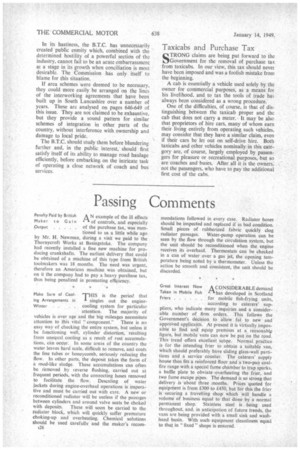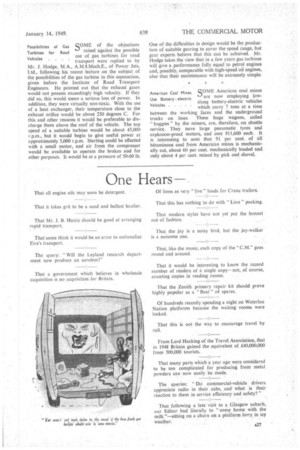Passing Comments
Page 28

Page 29

If you've noticed an error in this article please click here to report it so we can fix it.
Penalty Paid by British A N example of the ill effects Maker to Gain 4Th of controls, and especially Output of the purchase tax, was men tioned to us a little while ago by Mr. H. Newman, during a visit we paid to the Thornycroft Works at Basingstoke. The company had recently installed a fine new machine for producing crankshafts. The earliest delivery that could ' be obtained of a machine of this type from British toolmakers was 18 months. The need was urgent, therefore an American machine was obtained, but on it the company had to pay a heavy purchase tax, thus being penalized in promoting efficiency.
Make Sure of CoolTHIS is the period that ing Arrangements in A singles out the engine Winter . . cooling system for particular
attention. The majority of vehicles is over age and the big mileages necessitate
attention to this vital component." There is no easy way of checking the entire system, but unless it be functioning well, cylinder distortion, resulting from unequal cooling as a result of rust accumulations, can occur. In some areas of the country the water leaves hard scale, difficult to remove, and coats the fine tubes or honeycomb, seriously reducing the flow. In other parts, the deposit takes the form of a mud-like sludge. These accumulations can often be removed by teverse flushing, carried out at frequent periods, with the connecting hoses removed to facilitate the flow. Descaling of water jackets during engine-overhaul operations is imperative and must be carried out with care. A new or reconditioned radiator will be useless if the passages between cylinders and around valve seats be choked
with deposits. These will soon be carried to the radiator block, which will quickly suffer premature choking-up and overheating. Chemical solutions should be used carefully and the maker's recom s26
mendations followed in every case. Radiator hoses should be inspected and replaced if in bad condition. Small pieces of rubberized fabric quickly clog radiator passages. Water-pump operation can be seen by the flow through the circulation system, but the unit should be reconditioned when the engine receives its Overhaul. Thermostats can be checked in a can of water over a gas jet, the opening temperature being noted by a thermometer. Unless the action be smooth and consistent, the unit should be discarded.
Great Interest Now A CONSIDERABLE demand Taken in Mobile Fish 1-1has developed in Scotland Friers for mobile fish-frying units, according to caterers' suppliers, who indicate many inquiries and a considerable number of .firm orders. This follows the Government's decision to allow fat to new and approved applicants. At present it is virtually impossible to find and equip premises at a reascinabl figure, but mobile vans can now be put On the road. This trend offers excellent scope. Normal practice is for the intending frier to obtain a suitable van, which should preferably have sliding glass-wall partitions •and a service counter. The caterers' supply house then fits a reinforced floor and a two-pan coalfire range with a special fume chamber to trap sparks, a bathe plate to obviate overheating the frier, and two fume escape pipes. The demand is so strong that delivery is about three months. Prices 'quoted for equipment is from £300 to £450, but for this the frier is securing a travelling Shop which will handle a volume of business equal to that done by a normal permanent shop. Stainless steel is being used throughout, and, in anticipation of future trends, the vans are being provided with a small sink and washhand basin. With such equipment cleanliness equal to that in " fixed " shops is ensured. q0ME of the objections
raised against the possible use of gas turbines for road transport were replied to by Mr. J. Hodge, M.A., A.M.f.Mech.E., of Power Jets, Ltd., following his recent lecture on the subject of the possibilities of the gas turbine in this connection, given before the Institute of Road Transport Engineers. He pointed out that the exhaust gases would not possess exceedingly high velocity. If they did so, this would mean a serious loss of power. In addition, they were virtually non-toxic. With the use of a heat exchanger, their temperature close to the exhaust orifice would be about 250 degrees C. For this and other reasons it would be preferable to discharge them above the roof of the vehicle. The top speed of a suitable turbine would be about 45,000 r.p.m., but it would begin to give useful power at approximately 5,000 r.p.m. Starting could be effected with a small motor, and air from the compressor would be available to operate the brakes and for other purposes. It would be at a pressure of 50-60 lb. Possibilities 01 Gas Turbines for Road Vehicles . . . One of the difficulties in design would be the production of suitable gearing to cover the speed range, but gear experts believe that this can be achieved. Mr. Hodge takes the view that in a few years gas turbines will give a performance fully equal to petrol engines and, possibly, comparable with high-speed oil engines, also that their maintenance will be extremely simple.
3omE American coal mines
are now employing lowslung battery-electric vehicles which carry 7 tons at a time between the working faces and the underground trucks on lines. These huge wagons, called " buggies " by the miners, are, therefore, on shuttle service. They have large pneumatic tyres and explosion-proof motors, and cost $11,600 each. It is interesting to note that 91 per cent. of all bituminous coal from American mines is mechanically cut, about 60 per cent. mechanically loaded and only about 4 per cent. mined by pick and shovel.
American Coal Mines Use Battery electric Vehicles




























































































